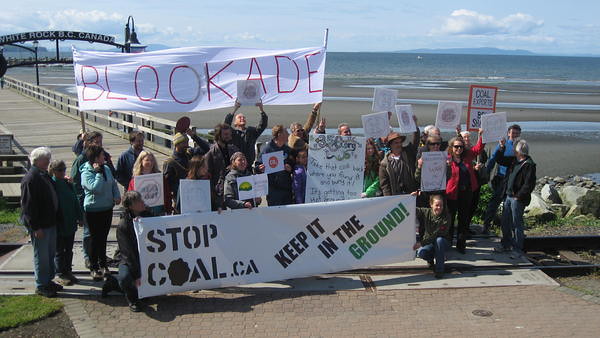Here are our friends in BC–many arrested later in the day for blocking a coal train!

From the Gura River in Kenya

And a note from Joram Mathenge, Coordinator-Kiangure Springs Environment Initiative,www.kiangurespringsenvironment.org
Hello People,
I take this apportunity to thank all of you who took part in the DOT
campaign world wide.
Here in Central Kenya our event was Fruitful.
We highlighted River Gura , the fastest river in Africa
en.wikipedia.org/wiki/Nyeri which is under great threat due to
climate change.During the months of February and March before the rains the
river was almost dry due to effects of climate change.Now its full and
causing alot of havoc in the area .
We educated the local farming community about the effects of climate
change and how it translated to their every day lives.
We enjoyed this great event and also recorded a video which we will upload
for the world to see river Gura in its full force.
The farming communities depending on this river are being educated on how
to adapt to climate change and utilise the river sustainably.
We look foward to more events in the future,
Regards
Horses Helping Out in Peru, New York USA
Where many are still ou t of their homes after last year's floods
t of their homes after last year's floods
They Know the Key Number in San Ramon de Alajuela, Costa Rica!

Metro Boston Civil Defense
At subway stops around this city on the east coast of North America they handed out new subway maps--showing the trains replaced by ferries because of a rising ocean!
People in Pasadena California have not forgotten
 Unprecedented winds last December, which did $40 million in damage!
Unprecedented winds last December, which did $40 million in damage!
Falls Village, Connecticute USA

Our New York City synagogue was at a Jewish farm and retreat center where much of the summer crop was lost in Hurricane Irene. Two months later, the center lost electricity for 8 days as a result of a freak October snowstorm.
9-year-old Jada connects the dots about sea level rise in Fort Lauderdale Florida

Damaged Coral off Oahu Hawaii Draws the Link to Ocean Acidification

Amazing Image from Our Crew in Mongolia!
Climate change already has serious impacts in Mongolia and it is most visible with drying up of water bodies. Throughout the country many rivers and lakes have dried up and desert areas are expanding. All of this affects the nomadic people of Mongolia whose livelihoods directly depend on intact ecosystems. Thus, climate change has impacts beyond that of biophysical, but also socio-economic and cultural. They formed a dot on the Dund River in Ulaanbaatar which used to be a big river but now only flows when the snow melts in the spring.